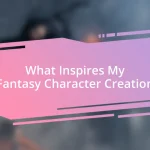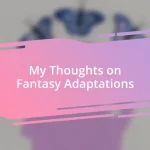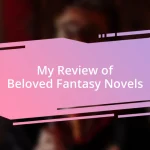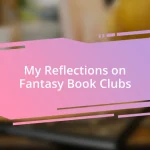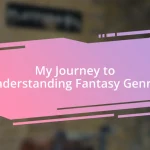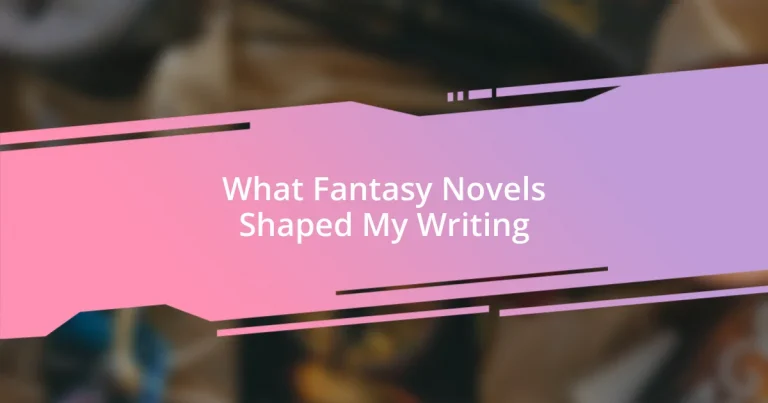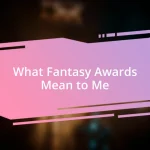Key takeaways:
- Fantasy novels ignite imagination and provide profound insights into morality and human values through character dilemmas.
- Key authors like J.R.R. Tolkien, C.S. Lewis, and Ursula K. Le Guin have significantly influenced storytelling techniques and character development in the genre.
- Themes such as the struggle between good and evil, identity quests, and the importance of friendship resonate deeply, shaping emotional narratives and character journeys.
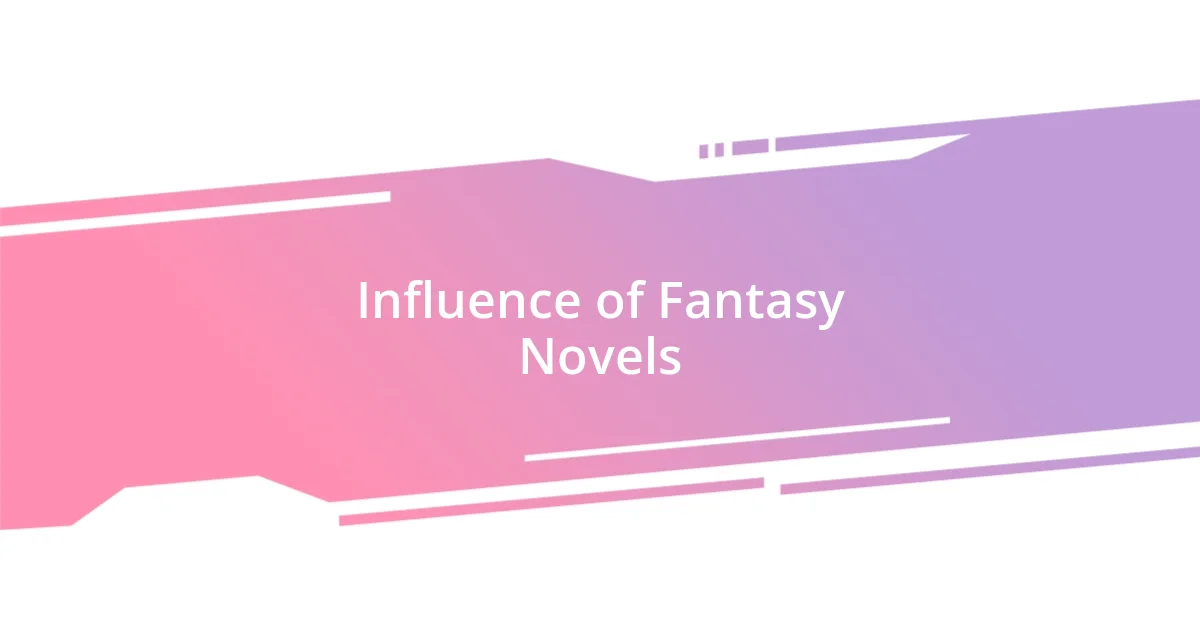
Influence of Fantasy Novels
Fantasy novels have a remarkable ability to transport us to worlds filled with limitless possibilities. I remember curling up with a well-loved copy of “The Hobbit” during a rainy afternoon. The sense of adventure Bilbo Baggins experienced ignited my own imagination, prompting me to wonder: what adventures awaited me beyond my front door?
As I delved deeper into the realm of fantasy, I found that these stories offered more than just escapism; they revealed profound truths about humanity. For instance, the moral dilemmas faced by characters like Frodo Baggins and Daenerys Targaryen challenged me to reflect on my own values and decisions. How often do we confront our own dragons, both literal and metaphorical, in pursuit of our dreams?
Additionally, the intricate worlds and diverse characters introduced in these novels shaped the way I approach storytelling. I began to appreciate the power of creating rich backstories and settings, elements that can make or break a narrative. It’s fascinating to think about how a single book can inspire countless others, isn’t it? The intricate landscapes and emotional depths especially linger in my mind, influencing every story I write.
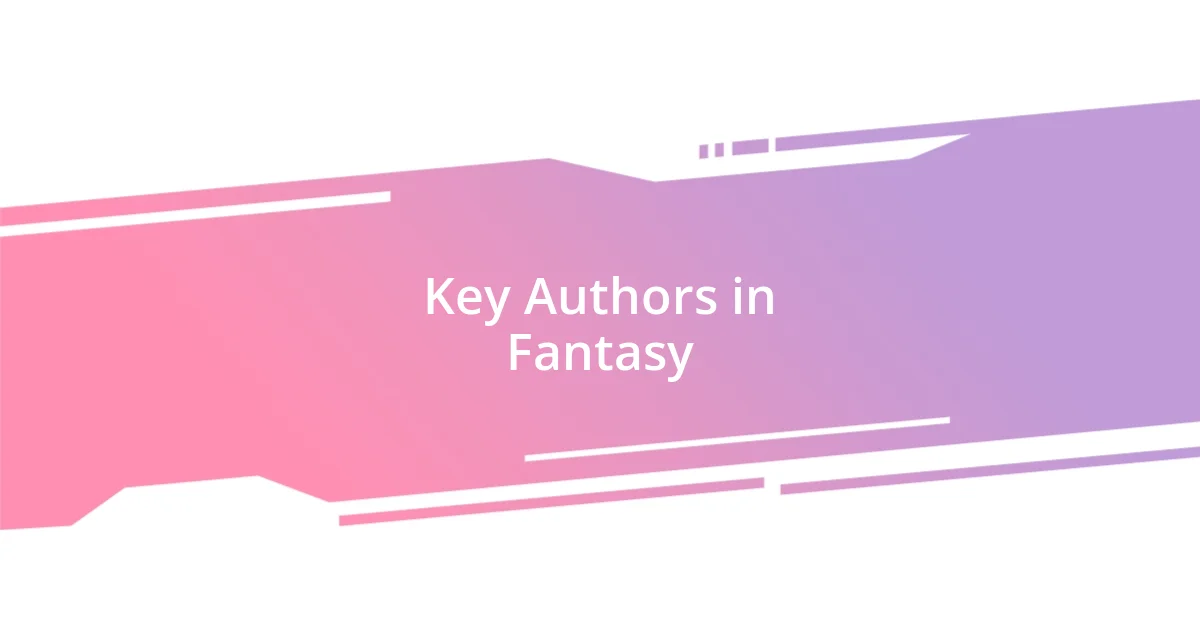
Key Authors in Fantasy
The world of fantasy is rich with authors who have left a lasting imprint on the genre and, undoubtedly, on my own writing journey. For instance, J.R.R. Tolkien didn’t just create a world; he crafted entire languages, cultures, and histories that resonate deeply with readers. I vividly recall being mesmerized by the detail in “The Lord of the Rings.” Tolkien’s ability to intertwine lore with character development inspired me to think critically about the backgrounds of my own characters.
Some key authors who have shaped the fantasy genre include:
- J.R.R. Tolkien: Known as the father of modern fantasy literature, his epic works laid the foundation for the genre.
- C.S. Lewis: His blend of allegory and fantasy in “The Chronicles of Narnia” provided a unique perspective on morality and storytelling.
- Ursula K. Le Guin: I admire her work, especially “The Earthsea Cycle,” for its exploration of identity and deep philosophical themes.
- George R.R. Martin: His complex characters and morally ambiguous plots in “A Song of Ice and Fire” revealed how realism can breathe life into fantasy.
- Brandon Sanderson: His innovative magic systems in series like “Mistborn” have taught me the importance of crafting rules within fantastical worlds.
Each of these authors not only entertained me but also ignited new ideas and approaches in my writing, paving the way for my growth as a storyteller. I often find myself reflecting on how their unique styles can inspire me to think outside the box when developing my narratives.
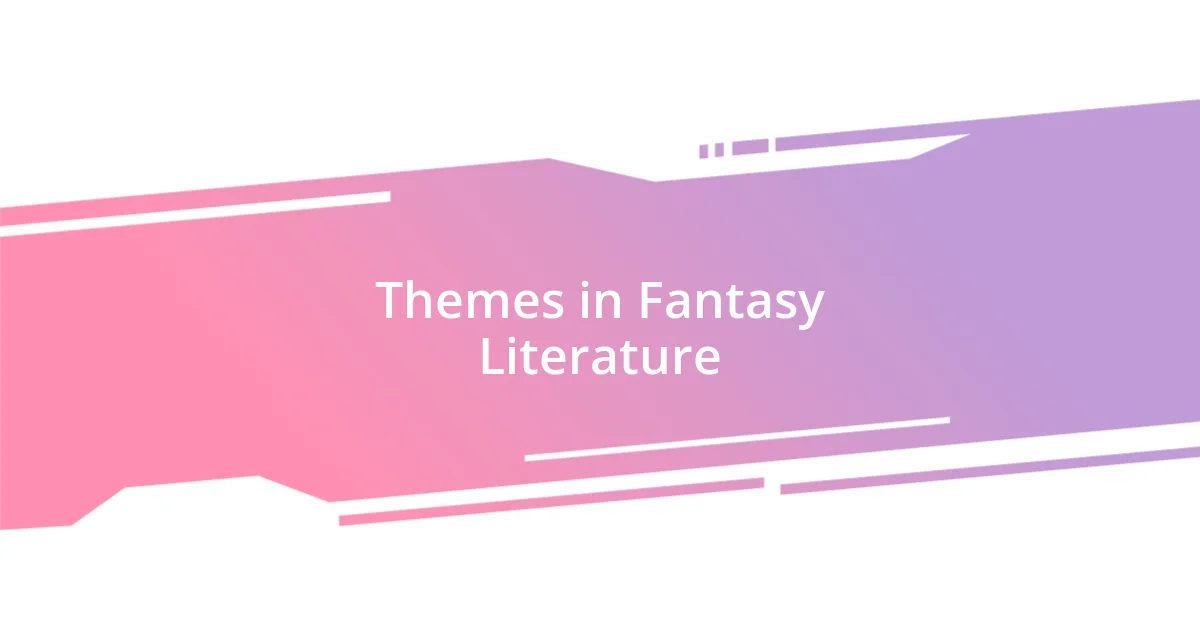
Themes in Fantasy Literature
Fantasy literature is a treasure trove of themes that resonate deeply with readers. One theme that particularly captivates me is the classic struggle between good and evil. I often recall the intense battles between characters like Harry Potter and Voldemort, where choices define their destinies. This duality not only entertains but also compels me to examine my own moral compass in real life—what choices am I making every day?
Another prominent theme in fantasy is the quest for identity. How many characters have embarked on journeys that led them to self-discovery? I remember feeling an overwhelming connection to Lyra Belacqua from “His Dark Materials.” Her exploration of consciousness and personal growth mirrored my own struggles during tumultuous times in my life. Fantasy offers a lens through which we can explore our true selves, and this has profoundly impacted the characters I create.
Additionally, themes of friendship and camaraderie frequently emerge in these tales, reinforcing the importance of relationships. I fondly think of the Fellowship of the Ring, where each character brought unique strengths to their journey. This idea inspires me to cultivate diverse character relationships in my writing, as I believe that it’s not just the adventures that matter, but the bonds formed along the way that define the narrative.
| Theme | Description |
|---|---|
| Good vs. Evil | The classic struggle that drives conflict and showcases moral choices. |
| Quest for Identity | Characters embark on journeys that lead them to self-discovery. |
| Friendship | Emphasizes the significance of relationships and camaraderie in storytelling. |
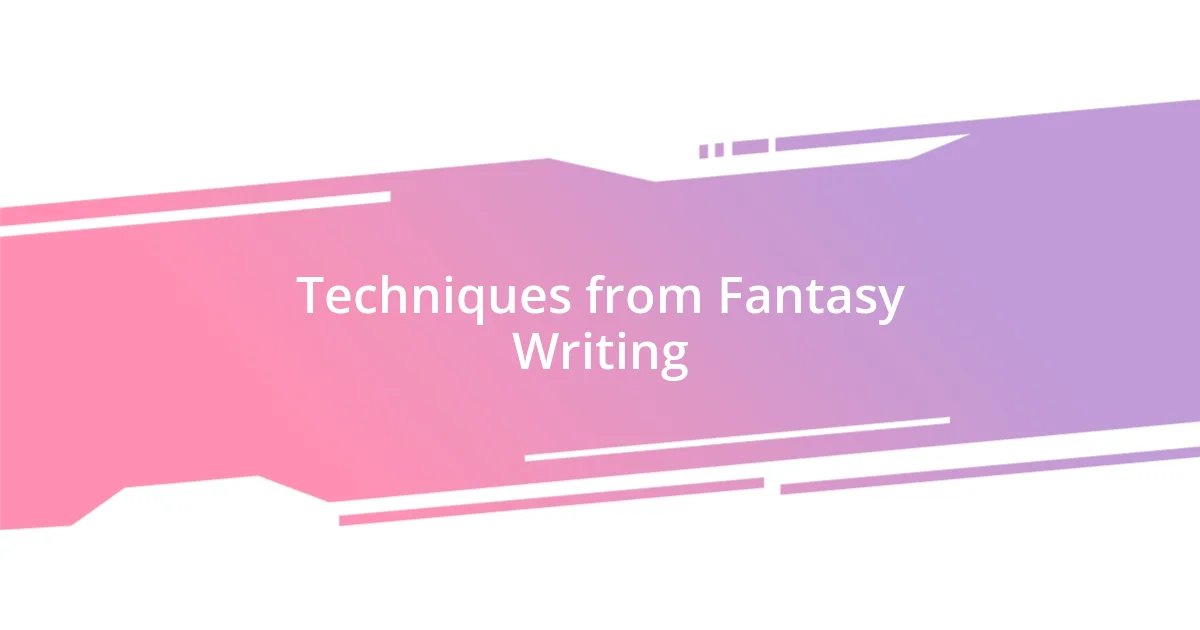
Techniques from Fantasy Writing
When I delve into fantasy writing, I can’t help but appreciate the intricate world-building techniques employed by authors. Take, for example, the way Tolkien constructed Middle-earth – it’s not just a backdrop; it’s a living entity brimming with its own languages, maps, and histories. I often ponder how much effort goes into creating such depth and how I can incorporate similar principles into my storytelling. How do I balance detail with pacing? It’s a challenge but capturing that essence is crucial.
One technique that consistently intrigues me is the use of archetypes. Characters like the wise mentor or the reluctant hero, seen in various forms across many stories, resonate with readers because they reflect universal experiences. This recognition pushes me to dissect my character choices carefully. Am I exploring those archetypes in fresh ways? I remember crafting a mentor character who initially seemed predictable, but as I explored their backstory, they transformed into someone more nuanced and relatable. It taught me that even familiar roles can surprise both the writer and the reader.
Finally, I find immense value in the emotional layers that fantasy can communicate. The ability to weave profound themes of loss, hope, and resilience into a fantastical narrative leaves a lasting impact. When I read Le Guin’s work, I often feel a surge of inspiration that compels me to explore my characters’ vulnerabilities. How do they cope with tragedy? This question leads me to create scenes that not only drive the plot forward but also deepen the reader’s connection to the characters. Through fantasy, I find a unique lens to reflect on human emotions, making my stories more resonant and relatable.

Impact on My Writing Style
The influence of fantasy literature has significantly shaped my writing style, especially in how I approach character development. I often find myself reflecting on characters’ emotional journeys, much like how I felt while reading “The Night Circus.” The intricate relationship between Celia and Marco taught me the power of love not just as a plot device, but as a means of transformation. I strive to infuse my characters with similar complexities, making their relationships a driving force in the narrative.
I’ve also noticed how fantasy narratives often embrace a lyrical quality in their prose. Reading authors like Susanna Clarke inspires me to play with language in my writing. I remember the first time I experimented with vivid imagery while describing a sunset in one of my stories; it felt like capturing magic on the page. Asking myself how I can evoke strong visual emotions pushes me to refine my word choice and sentence structure, elevating the reader’s experience.
Moreover, the pacing in fantasy novels teaches me the importance of balancing tension and tranquility. I recall a gripping moment in “A Song of Ice and Fire” where the sudden shifts in pace had me holding my breath. It makes me think: how can I achieve that in my own writing? My goal is to weave moments of suspense with quieter reflections, allowing readers to both race ahead and linger in introspection. This dynamic creates a rhythm that keeps the reader engaged while also deepening their emotional understanding of the story.

Personal Takeaways from Reading
Reflecting on my reading habits, I’ve discovered that fantasy literature often challenges me to step beyond my comfort zone. I recall the first time I tackled a complex narrative like Gaiman’s “Neverwhere.” As I navigated the layers of characters and plot twists, I realized that embracing uncertainty can lead to profound moments in storytelling. How often do I allow my stories to wander off the well-trodden path? I’ve since learned that the unexpected can be a powerful tool in creating intrigue.
Another significant takeaway has been the recognition of diverse perspectives in storytelling. Reading books with varied cultural backgrounds, like “The Poppy War” by Kuang, opened my eyes to the richness of different worldviews. The intense experiences of the characters compelled me to think about how I represent diversity in my writing. Am I creating spaces for readers from different backgrounds to see themselves in my characters? This question has encouraged me to explore deeper themes and broaden my narrative horizons.
Lastly, I often find myself inspired by the blending of myth and reality in fantasy novels. When I first read “American Gods,” I was struck by how Neil Gaiman weaves traditional myths into contemporary settings. I realize that this interplay allows for a unique exploration of identity and belief. How can I incorporate elements of myth into my own stories? This realization has motivated me to play with folklore and incorporate it into my narratives, enriching them with deeper cultural layers that resonate with readers on multiple levels.

Recommended Fantasy Novels
When considering fantasy novels that have truly shaped my writing, I can’t help but mention “The Name of the Wind” by Patrick Rothfuss. The lyrical prose and the way it immerses readers into a world filled with rich details constantly inspire my own writing style. I remember closing the book and thinking, “How can I create a world as enchanting and vivid?” Rothfuss has this incredible ability to make even the sound of a character’s footsteps resonate with meaning, which pushes me to think more deeply about sensory experiences in my stories.
Then there’s “Good Omens” by Neil Gaiman and Terry Pratchett, a delightful mix of humor and insight that has significantly impacted my approach to dialogue. I often recall laughing out loud at the exchanges between Aziraphale and Crowley, each banter igniting joy and contemplation. It made me wonder: how can I infuse my characters’ conversations with both wit and wisdom? This novel taught me that dialogue can be a powerful tool to deliver depth while still entertaining readers, and I strive to capture that essence in my own work.
Lastly, I’ve been profoundly influenced by “The Hobbit” by J.R.R. Tolkien. The journey of Bilbo Baggins spoke to me long after I turned the last page. It made me reflect on the importance of the hero’s journey in capturing readers’ hearts—every character must transform in some way. I find myself asking, “What obstacles will they face, and how will those challenges shape who they become?” This exploration of growth and transformation is a guiding principle in my writing, ensuring that my characters resonate authentically with readers.

